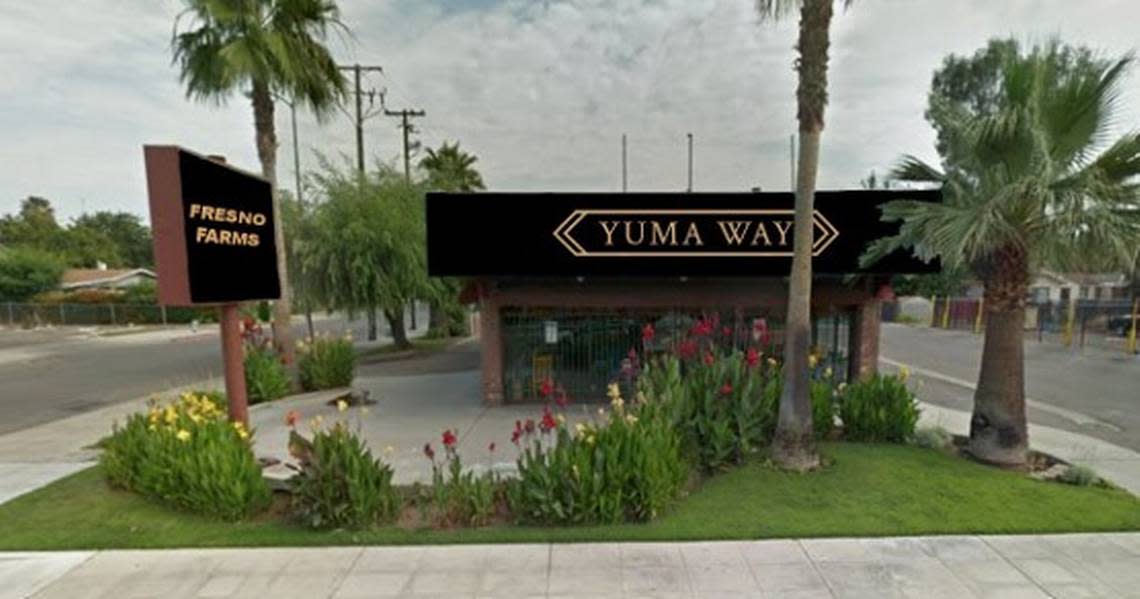‘Not the right place.’ City Council overturns approval of Fresno cannabis dispensary

Misgivings over a cannabis company’s track record in other states, including a citation in Colorado for selling to a minor and a lawsuit alleging labor law violations, prompted the Fresno City Council to unanimously reject its permit for a retail dispensary in southeast Fresno.
Colorado-based Yuma Way Cannabis Co. had already won approval from the city’s Planning Commission in March for its proposed Fresno Farms weed shop at the northeast corner of Cesar Chavez Boulevard, formerly Kings Canyon Road, and Jackson Avenue, across the street from the Fresno Fairgrounds. The building is a former Mexican restaurant.
But City Councilmember Luis Chavez, whose district includes the location, appealed that decision and led the effort on Thursday to overturn the approval of a conditional use permit for the dispensary. Yuma Way has already received a retail cannabis license from the state Department of Cannabis Control, but local cities and counties have the final say by way of local zoning and permit requirements.
Yuma Way had originally applied for a site about six blocks to the west, at Cesar Chavez Boulevard between Eighth and Ninth streets — a site directly across the street from the Fresno Unified School District’s future Farber Education Campus.
“The one concern I’ve always had has been the location and making sure it’s not a detriment to the surrounding community (and) surrounding businesses,” Chavez said.
Yuma Way operates 16 dispensaries in five states, including 10 in Colorado. Its lone California shop is in Oxnard, in Ventura County.
Earlier this year, Chavez was critical of the company for selecting its first site without knowing it was across the street from a school that was at that time not yet under construction. “Then they again decided to get a location that, in my view, is in close proximity to a lot of sensitive places that I don’t believe this is the right place for this,” he said. The new location is about a quarter mile southeast of Roosevelt High School.
The city’s codes prohibit cannabis businesses from operating within 800 feet of any school serving children in grades from pre-school through high school.
Last fall, Chavez challenged Yuma Way CEO Margarita Tsalyuk and other partners, twice asking if any of the company’s stores had been cited or fined for selling cannabis products to minors. The representatives said no, but acknowledged misspeaking after Chavez provided information that one of the Colorado stores had run afoul of the law forbidding sales to minors.
In California, legal marijuana and cannabis products can only be sold to people age 21 or older, or 18 or older for people with a medical marijuana card.
Councilmember Tyler Maxwell said he was troubled after learning that Yuma Way is being sued for allegedly denying employees their mandatory break periods; Chavez said he also was concerned by the lawsuit.
The combination of factors including the underage sale, the site selection and the lawsuit “shows a track record of the folks that we’re having come into our city,” Chavez said.
Jessica Reuven, Yuma Way’s chief compliance officer, told councilmembers via Zoom that the company is contesting the case, which she said was filed by “one disgruntled employee.” “I hope that you guys will go with ‘innocent until proven guilty,’” she said.
The company presented the city with petitions of support signed by more than 100 people, as well as several letters backing Yuma Way’s efforts.
But the city also received letters of opposition from nearby residents and businesses. Jose Nino, who operates the Furniture and Mattress Superstore next door to the Yuma Way location, addressed the council Thursday representing about three dozen other businesses along Cesar Chavez Boulevard.
In a letter to the council, Nino wrote that “having a dispensary close to the business will only have negative impact on my customers and put my business and surrounding businesses at risk of going out of business.”
“A dispensary will only promote decay and vagrancy to an already vulnerable area,” he added.
Tsalyuk told The Fresno Bee by telephone on Thursday afternoon that she was saddened and frustrated by the council’s vote.
“We did everything they asked for,” she said. “We dotted all the ‘i’s’ and crossed all the ‘t’s.’ ... We even offered to be closed” during the Big Fresno Fair, and an additional condition imposed by the Planning Commission called for providing more armed security at the store during the fair and the annual Hmong New Year celebration at the fairgrounds.
As she and her partners digested the council’s vote, Tsalyuk said “all options are on the table,” including possible legal action against the city. “I felt that I had an agreement with the city, that we entered a contract with the city of Fresno,” she said.
The company may also consider looking for yet another site in southeast Fresno, but is concerned that the same concerns would be raised again to challenge it. The council’s vote “is very narrow-minded, very sad,” Tsalyuk said, adding that the council “is doing the city a disservice” by rejecting the permit application.
Fresno currently has 13 state-licensed dispensaries operating in the city — an increase of more than six-fold from a year ago when there were only two cannabis retailers.

